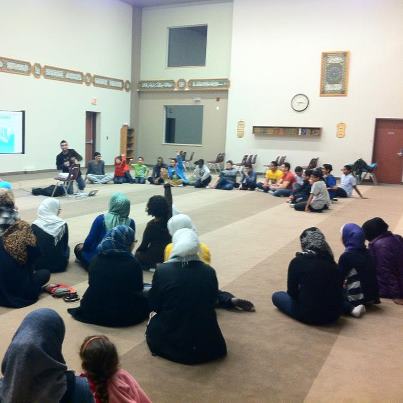
There are many different organizations being set up these days to teach Islamic knowledge in English, some of them use distance learning methods. (Photo: Onislam)
By: Amal Stapley*
One of the biggest challenges new Muslims face is in regard to seeking knowledge, especially nowadays when there is so much information available and so many apparently contradictory views.
It’s difficult to know where to start, where to look and who to turn to.
It’s also difficult to give specific advice about seeking knowledge, as God brings people to Islam along many different paths, according to what would suit them best.
Also Read: Imaam Yakhsyallah: Nurture Love for the Prophet, One Will Be with Whom One Loves
They therefore come from many different backgrounds, have many different perspectives and also many different learning styles; so it’s impossible to give a one-fits-all suggestion.
But as can be seen by the problems faced by the sisters I mentioned in challenges faced by western Muslims women converts it’s an issue that needs to be addressed and here are some basic suggestions that can be referred to.
Initial Sources
Prophet Muhammad said: “Seeking knowledge is obligatory upon every Muslim (male and female).” ( H.R. Ibn Majah)
There is no doubt in this, but what sort of knowledge should you learn?
Also Read: Thanksgiving: An Islamic Perspective
The priority is to learn what will bring you closer to God in the way that He wants you to come closer to Him. And the only way you can find out how to do that is to learn about Islam from sound sources. In the early days, it’s very difficult to know what the sound sources are, and it is something that will take time to discover, as it does when learning any subject. So all you can do in the early days is to find the best source that is available to you, as soon as you can.
Don’t delay your learning while looking for the best source; start as soon as you can with what you have. That may be with the person who has helped you to come to Islam, a local group that supports new Muslims, someone from the mosque or even someone you have found on the internet. The main thing is to start somewhere. If later on you find a better source, you can turn to them instead, but don’t wait too long as there are some things that you need to start learning about straight away.
First Priorities
You will already have learned quite a bit about Islam to have brought you to the point of wanting to say your Shahadah (Testimony of Faith), but it is likely that your learning will have been random and incidental and there are likely to be some significant gaps in your knowledge. If we look at the example of how Prophet Muhammad (peace be upon him) taught the early Muslims about Islam, you can use that as a guide to the priorities of what gaps you should initially try to fill.
For the first 13 years, while the Muslims were in Makkah, the Prophet concentrated on teaching his followers about God, their Lord and Creator; helping them to understand who He was and what their relationship with Him should be. So the first thing that a new Muslim needs to learn is about the Creed orAqeedah of Islam, as this is the basis of the faith and the foundation for the sound practice of the religion.
At this stage it is important to understand the basics and not get involved with all the different schools of thought. It’s important to develop your relationship with God and get closer to Him. In terms of practice, the first thing that a new Muslim needs to start learning is how to pray. This is the first thing people will be asked about on the Day of Judgment, which shows how important it is:
Also Read: Achieving the Position of Fasting Expert with Kindness of Morality
“The first matter that the slave will be brought to account for on the Day of Judgment is the prayer. If it is sound, then the rest of his deeds will be sound. And if it is bad, then the rest of his deeds will be bad.” (H.R. Al-Tabarani)
Your intention should be to learn the basics of the prayer, so you can gradually build up to praying all the five obligatory daily prayers on a consistent basis. Although there are some minor differences in the way people pray, most of them are following the example given by Prophet Muhammad (peace be upon him). As long as you follow the way the Prophet showed, your prayer will be accepted Insyaa Allah.
Next Priorities
Once these basics have been established, the next stage is to start learning about the other obligatory acts of worship, such as fasting, Zakat and Hajj, so you can put them into practice when the time comes. As Prophet Muhammad said: “Knowledge has priority over preaching and action.” (H.R. Al-Bukhari)
So seek out the knowledge you need to enable you to put your faith into practice. It is obligatory on Muslims to learn Arabic, at least to the level that they can perform their prayers. This doesn’t necessarily involve joining a full Arabic language course, but you should learn how to pronounce the Arabic from the prayer as best as you can, even if you’re learning it from transliterations rather than the Arabic script.
Alongside the acts of worship, you’ll need to learn the Islamic guidance that relates to your daily life, work and relationships, so you can develop the manners, conduct and morals that please God. This will include subjects such as how to treat your family and neighbors; the relationship between men and women, and marriage; the rulings that relate to transactions and whatever line of business or work you are involved in. This may sound a bit heavy at this stage, but it’s worth checking these things out and getting advice from the best sources you can on how to put them into practice in your situation.
Also Read: The Power of Charity in Ramadan
I also suggest that all new Muslims should try to read the Quran in its entirety at least once. If you read it like an ordinary book from page 1 to the end, it will give you an amazing impression of the message that God set down to us.
You can study it in more detail later on, but reading it once is so beneficial.(T/Imt/R04)
*This article first published at onislam.net
Mi’raj Islamic News Agency (MINA)
Also Read: Ramadan Brings the Change































 Mina Indonesia
Mina Indonesia Mina Arabic
Mina Arabic